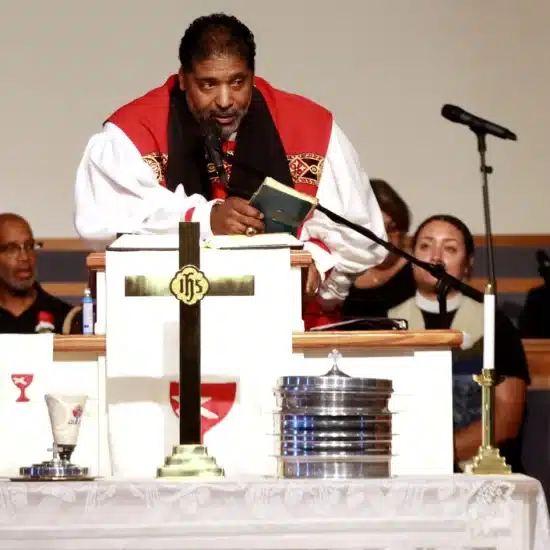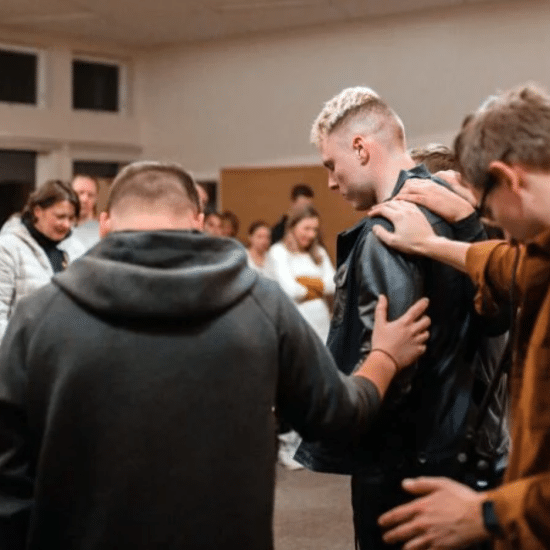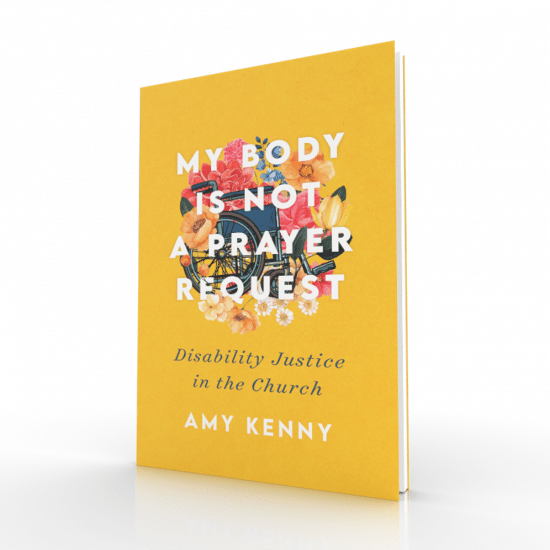
NASHVILLE (BP) — Virtually every Protestant pastor and churchgoer believes a person with a disability would feel at home at their church, but fewer are taking active steps to make sure this is the case.

Image by klimkin from Pixabay
A new survey from Nashville-based LifeWay Research asked Protestant pastors and churchgoers about their church and those with disabilities.
Nearly every pastor (99 percent) and churchgoer (97 percent) says someone with a disability would feel welcomed and included at their church.
As a mother of a son with cerebral palsy, Jamie Sumner says every church has the possibility to be welcoming to those with disabilities, but it takes intentional actions to convince families impacted by special needs that a church wants to accommodate them.
“Until you have a plan in place that accommodates those with special needs all the way from nursery-age to senior citizen, then you can’t accurately make this claim,” said Sumner, author of Eat, Sleep, Save the World, a B&H Publishing book for parents of children with special needs.
When her son was born, Sumner said her church built a program for him when one didn’t exist. “They hired a team, did research, brought in volunteers and changed the layout of their Easter egg hunts and all of our other get-togethers in order to accommodate those with extra needs,” she said.
In the past seven years, Sumner’s church has built a ministry from the ground up, which she said is the best-case scenario. “They asked us what we needed and started slowly. Now we serve many families with children with special needs,” she said. “It’s a lot of work, but it has changed our lives.”
Pastors seem to agree churches should make adjustments for those with special needs.
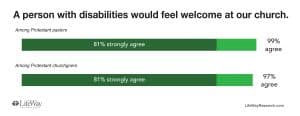 Almost all pastors (99 percent) say local churches should make necessary facility modifications to become more accessible to people with physical disabilities even when it is not required by law.
Almost all pastors (99 percent) say local churches should make necessary facility modifications to become more accessible to people with physical disabilities even when it is not required by law.
Three-quarters of Protestant pastors (76 percent) say local churches have a responsibility to provide financial resources and support to individuals with disabilities and their families.
“Jesus’ parable of a shepherd leaving the 99 to pursue one lost sheep demonstrates the priority churches must place on providing access to everyone,” said Scott McConnell, executive director of LifeWay Research.
“It may inconvenience the current flock by moving a teaching location or changing activities, but pastors and churchgoers say they see the need to do so. They believe creating access for everyone to hear the Gospel and participate in the body of Christ matters.”
What churches are doing
Almost every pastor (95 percent) says their church is involved in at least one of five different ways to care for those with disabilities and their families.
Three in 4 pastors (75 percent) say their church encourages volunteering in community events, like the Special Olympics, for people with disabilities.
Most say they provide financially for families with ongoing needs (70 percent) or provide respite for family caregivers to give them a break (60 percent).
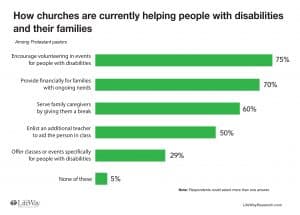 Half of churches (50 percent) provide an additional teacher to aid a person with special needs in a class.
Half of churches (50 percent) provide an additional teacher to aid a person with special needs in a class.
Fewer pastors (29 percent) say their church provides classes or events specifically for people with disabilities.
Larger churches are more likely than others to say they help in many of these specific ways. That gap is particularly pronounced when examining which churches provide an additional teacher for the individual with special needs.
While three quarters (75 percent) of churches with worship attendance topping 250 say they provide such assistants, 54 percent of churches with 100 to 249, 46 percent of churches with 50 to 99, and 35 percent of churches with less than 50 say they do the same.
“Many churches likely won’t have the resources to provide classes or events specifically designed for only those with disabilities, but they will still have opportunities to help those individuals participate in the life of their church,” said McConnell.
What churches need to do
While some churches may believe it is a matter of attitude or politeness, that isn’t what matters most to those with disabilities and their families.
Sumner says the churches that have been less welcoming to her family haven’t necessarily been less friendly than others, but those churches simply didn’t consider the needs of her son or their family. “You have to make an extra effort,” she said. “If that isn’t done, we don’t go back.”
For Sumner this is a vital issue because “everyone deserves a church home. Jesus asks us to care for those in need, not only those in poverty, but those in need of fellowship, friends and support,” she said.
“We must show those who walk through the world differently from us that we have thought about them and have made room for them. It’s not their job to pave the way. It’s our job to make the way easier for them first.”
Churches seeking to provide a welcoming place for people with disabilities should begin by finding out from those with experience how they can improve.
“Consider all the areas that must be met — spiritual, physical, social and emotional — and then ask special needs coordinators at other churches how they meet those needs at every age level,” she said. “Bring in experts and be willing to listen to their feedback.”
Methodology:
The phone survey of 1,000 Protestant pastors was conducted Aug. 30 to Sept. 24, 2019. The calling list was a stratified random sample, drawn from a list of all Protestant churches. Quotas were used for church size.
Each interview was conducted with the senior pastor, minister or priest of the church called. Responses were weighted by region to more accurately reflect the population. The completed sample is 1,000 surveys. The sample provides 95 percent confidence that the sampling error does not exceed plus or minus 3.3 percent. Margins of error are higher in sub-groups.
The online survey of 1,002 American Protestant churchgoers was conducted Sept. 20-27, 2019 using a national pre-recruited panel.
Respondents were screened to include those who identified as Protestant/non-denominational and attend religious services at least once a month. Quotas and slight weights were used to balance gender, age, region, ethnicity and education to more accurately reflect the population. The completed sample is 1,002 surveys. The sample provides 95 percent confidence that the sampling error from the panel does not exceed plus or minus 3.2 percent. Margins of error are higher in sub-groups.
The complete reports are available for pastors and churchgoers online.


